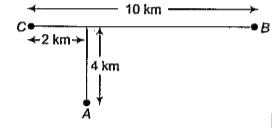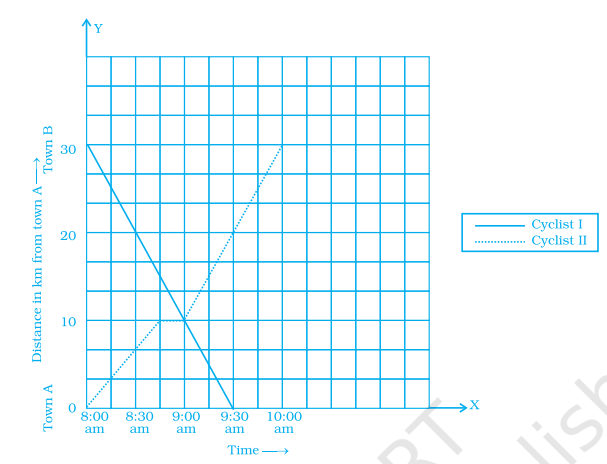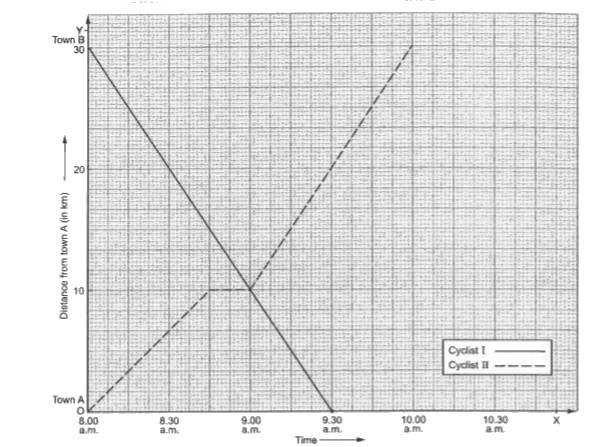A cyclist at C is cycling towards B. How far will he have to cycle from C before he is equidistant from both A and B?

6 km
5 km
4 km
3 km
The correct Answer is:B
Step by step video & text solution for A cyclist at C is cycling towards B. How far will he have to cycle from C before he is equidistant from both A and B? by Maths experts to help you in doubts & scoring excellent marks in Class 14 exams.
Updated on:21/07/2023Similar Questions
Twons A,B and C are on a straight line. Town C is between A and B. The distance A to B is 100 km. How far is A from C ?
(i) The distance from A to B is 25% more than the distance from C to B.
(ii) The distance from A to C is 14 of the distance from C to B.
View SolutionThe following graph shows the journey made by two cyclists, one from town A to B and the other from town B to A.
(a) At what time did cyclist II rest? How long did the cyclist rest?
(b) Was cyclist II cycling faster or slower after the rest?
(c) At what time did the two cyclists meet?
(d) How far had cyclist II travelled when he met cyclist I?
(e) When cyclist II reached town A, how far was cyclist I from town B?

View Solution
Knowledge Check
One day, Ravi left home and cycled 10 kms southwards, turned right and cycled 5 kms and turned right and cycled 10 kms and turned left and cycled 10 kms. How many kilometres will he have to cycle to reach his home straight ?
A10 kmsB15 kmsC20 kmsD25 kmsThe average of 4 distinct prime numbers a,b,c and d is 35, where a < b < c < d. and d are equidistant from 36 and b and c are equidistant from 34 and a, b are equidistant from 30 and c and d are equidistant from 40. the difference between a and d is :
A30B14C21Dcan't be determinedThe average of 4 distinct prime numbers a,b,c and d is 35, where a < b < c < d. and d are equidistant from 36 and b and c are equidistant from 34 and a, b are equidistant from 30 and c and d are equidistant from 40. the difference between a and d is :
A30B14C21DCan't determined
The following line graph shows the journey made by two cyclists, cyclist I and cyclist II, one from town B to town A and the other from town A to town B.

Study the above graph carefully and answer the questions given below :
(i) At what time did cyclist II rest ? For how long did the cyclist rest ?
(ii) Was cyclist II cycling faster or slower after the rest ?
(iii) At what time did the two cyclists meet ?
(iv) How far had cyclist II travelled when he met cyclist I ?
When cyclist II reached twon B, how far was cylist I from town A ?
View SolutionIn ΔABC,∠A=∠B+∠C. The point which is equidistant from A, B and C is _______
View SolutionRaju cycled 10 km South from his house, turned right and went 5 km and again turned right and cycled 10 km and then turned left and cycled 10 km. How many kilometres will he have to cycle back to reach his house?
View SolutionRaju cycled 10 km South from his house, turned right and went 5 km and again turned right and cycled 10 km and then turned left and cycled 10 km. How many kilometres will he have to cycle back to reach his house?
View SolutionIn the following questions, a sentence/ part of the sentence is printed in bold. Below are given alternatives to the bold sentence/part of the sentence at which may improve the sentence. Choose the correct alternative. In case no improvement is needed, your answer is No Improvement.
He lives far from the station.
View Solution
